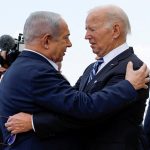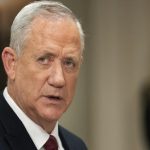Slowly and painfully, a new world order, free of US bullying, is taking shape. Lebanon must look to the few reliable defenders of peace — Russia, China, Iran — and unite to keep Lebanese alive and hopeful for a better future.
Faraan: In an exclusive article for Qods News Agency, Canadian political expert and journalist Eric Walberg wrote about the situation of Lebanon in the Middle East and the role of Saudi Arabia in the growing crisis in Lebanon. The text of the article is as below:
There is a long tradition of bad blood between Lebanon and Saudi Arabia. In 2017, in a totally bizarre televised statement from Saudi Arabia, Lebanese prime minister Saad Hariri tendered his resignation from office, citing Iran’s and Hezbollah’s political over-extension in the Middle East region and fears of assassination. When Hariri returned (escaped?) a week later to Beirut, he suspended his resignation. This bizarre episode was never explained, except by Iran, which called his resignation part of a plot by the United States, Israel, and Saudi Arabia to heighten Middle Eastern tensions.
Lebanon’s history of crisis, invasion by Israel, now bombing raids to Syria (with occasional bombs falling in Lebanon), has made its people brave, and they have no truck with Saudi-style hypocrisy. This does not go down well in either Riyadh or Washington. In May, Lebanon’s then-caretaker Foreign Minister Charbel Wehbe resigned after insinuating that Persian Gulf countries were behind the rise of ISIL (ISIS) in a heated argument with Saudi lobbyist Salman al-Ansari on Alhurra TV.
In an August interview, popular TV host George Kordahi made critical remarks about the Saudi-led coalition’s war against Houthi rebels in Yemen. The former game show host (since named Information Minister) said the Iran-aligned Houthis are ‘defending themselves against an external aggression.’ He said the war in Yemen was futile and it was time for it to end. That homes, villages, funerals, and weddings were being bombed, and this was unacceptable.
As the humiliation and disarray of the Arab states continues, Lebanon is the only voice of sanity, and Hezbollah is seen by most Lebanese as a vital force to confront Israel and to help Syria fight off its American-backed invaders.
This present name-calling is childish, merely highlighting the facts-on-the-ground in Yemen and the Saudi crimes that continue to be committed, as Saudi bombing raids are carried out daily.
The Arab League is without any direction now, after the UAE, Bahrein, Morocco and Sudan were pushed by Trump into recognizing Israel. It stands for brutal autocracy, cowardice, bigotry and humiliation.
It can’t be a fair mediator in dealing with multicultural Lebanon or with Shia-majority Yemen. It shamefully backs its Saudi paymasters, who sent troops in 2011 to Bahrein’s (Sunni) King Hamad to put down protests by his long-suffering Shia people. Then Saudi Prince Bin Salman launched a full-scale war on Yemen’s Shias in 2015. The Arab League has no goals other than to follow Saudi wishes.
Sanctions were imposed as part of UN resolution 1701 in 2006 following the Israeli war against Lebanon, intending to disarm Hezbollah (which Lebanon wouldn’t dare try, as Hezbollah is all that stands in Israel’s way). The US has a long-standing grudge against Hezbollah for its supposed involvement in the bombing of the US and French troops in 1983, and any hint of support of Hezbollah for its defiance of all invaders makes one an accomplice to terror, in US eyes.
So the US and its allies will support the Saudis against Lebanon, just like it continues to support the Saudis in Yemen, even though President Biden vowed to end arming the Saudis and to end the war in Yemen.
Even though Lebanon suffered a tragic explosion last year and its economy lies in ruins, the sanctions continue, with only Hezbollah and Iran having any interest in protecting Lebanon from the real foes. In an attempt to extend a lifeline, Iran has been hauling desperately needed shiploads of gasoline to Lebanon, braving the serious threat of being bombed and having it seized by US state pirates. Any thinking individual must applaud Iran’s goodwill gesture in the face of so much misery. But no, the sanctions continue, making a mockery out of diplomacy, showing the US for what it really is.
There is no easy way out for Lebanon now. Thankfully, there is a large Lebanese diaspora sending foreign currency to relatives. As with Iran, the people are suffering from western schemes to profit Israel. Slowly and painfully, a new world order, free of US bullying, is taking shape. Lebanon must look to the few reliable defenders of peace — Russia, China, Iran — and unite to keep Lebanese alive and hopeful for a better future.
As for Kordahi, there were immediate calls for him to resign, though he has been in no hurry. He is probably the most popular politician in Lebanon, was on good terms in the past with the Saudis, heading their MBC FM in London in 1990. In 2012, Kurdahi joined Al Hayat TV to present the TV show Who Wants to be A Millionaire. He was nominated as Minister of Information by the Christian Marada movement in Lebanon’s byzantine coalition politics. He is feisty and unlikely to change his views, which are so important as a rallying cry as the Middle East slides further into an ever-worsening Israel-made crisis.
Just as Bin Salman had to back off his attempt to cow Qatar into submission over its principled support of the Muslim Brotherhood, he will have to back off this equally spurious attack on Lebanon for its officials telling the truth to power. Perhaps all this will help to discredit the Saudi would-be king before he really becomes king. At the same time, Kurdahi should keep in mind the kidnapping of the Lebanese PM in 2017 and the fate of Saudi journalist Khashoggi in 2018, and keep away from Saudi hands.
Meanwhile, Hezbollah Deputy Secretary-General Naim Qassem last week called on Saudi Arabia to apologize for what he said was an “aggression” on cash-strapped Lebanon. And Israel is busy with military drills, getting ready to invade Lebanon yet again. Despite Lebanon’s economic crisis and Hezbollah is unlikely to launch a war amid such a dire situation, defense analysts warn that war is still possible. Israel thrives on war.










